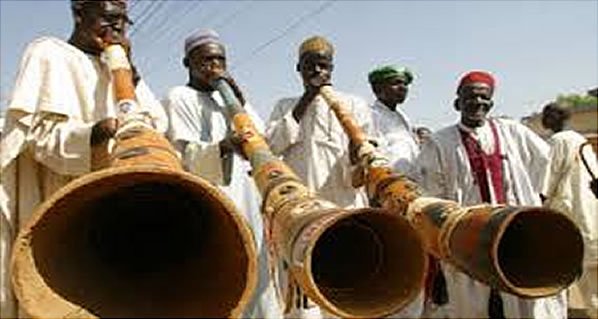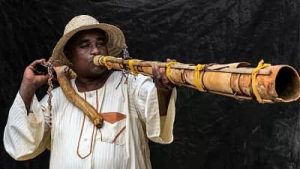Waza Musicians keep Traditional Sudanese Trumpet Alive

Khartoum – Sudan Events
In the last days of the sorghum harvest season in Sudan’s Nile region, traditional Waza musicians come out with their instruments which they make from the shanks of shallow pumpkin plant.T
heir Waza trumpets from stores and start washing and wetting them so they can easily accompany melodious singing.
“We wet it with water to tune the instrument. If we do not wet it, it will not play. We wet its body to make enhance the voice because when it is dry it will not work,” explained Hussein Abbas, a Waza Musician.
Before the band in the Ginais village in the Blue Nile State start to play, they select different sizes of the Waza. They then rehearse and tune their instruments ahead of their performance.
They also carefully select horns which act as percussion instruments. The horns have to be easy to hold to enable the musicians play the Waza at the same time.
“This horn should be shallow and strong as we hit the wood for rhythm. The members of the band use their legs to control the rhythm. They serve the same purpose as drums for us,” said Mohammed Hamad Al-Nil, the Waza Band Leader ,according to interview with agency.
When they are ready, the musicians hit the road and head into the village. Over ten instrumentalists play together and entertain gathering crowds.
“When we move it like that, it means you are trying to draw the attention of one of the band’s member to say that he is making a mistake or as a sign to the end of the piece of music,” added Al-Nil.

Various communities in Sudan play the Waza with many creating orchestral compositions.
Dafallah, is a researcher studying Sudanese Art and Culture. He says the Waza’s distinct sound is key to understanding the music here.
“The existence of the Waza in this community and environment determines how it is played and received. Here it is well loved and people receive and understand the music. But if it is taken to another environment, it could be perceived as dissonant,” he explained.
Skilled Waza musicians ensure they pass on their knowledge to the next generation. Hassan Abdul Rahim teaches a group of students at least three times a week.
“This is our heritage and we will not abandon it. I have a band of young players who come to train three times a week. When our term comes to an end they will replace us in playing,” he said.
Sudan’s Blue Nile region has experienced fighting between rebels and government forces since 2011.
For the people here cultural events like the Waza performances provide a much needed sense of normalcy.
Wind ensembles like the Waza are common in communities and ethnic groups across north and west Africa.



